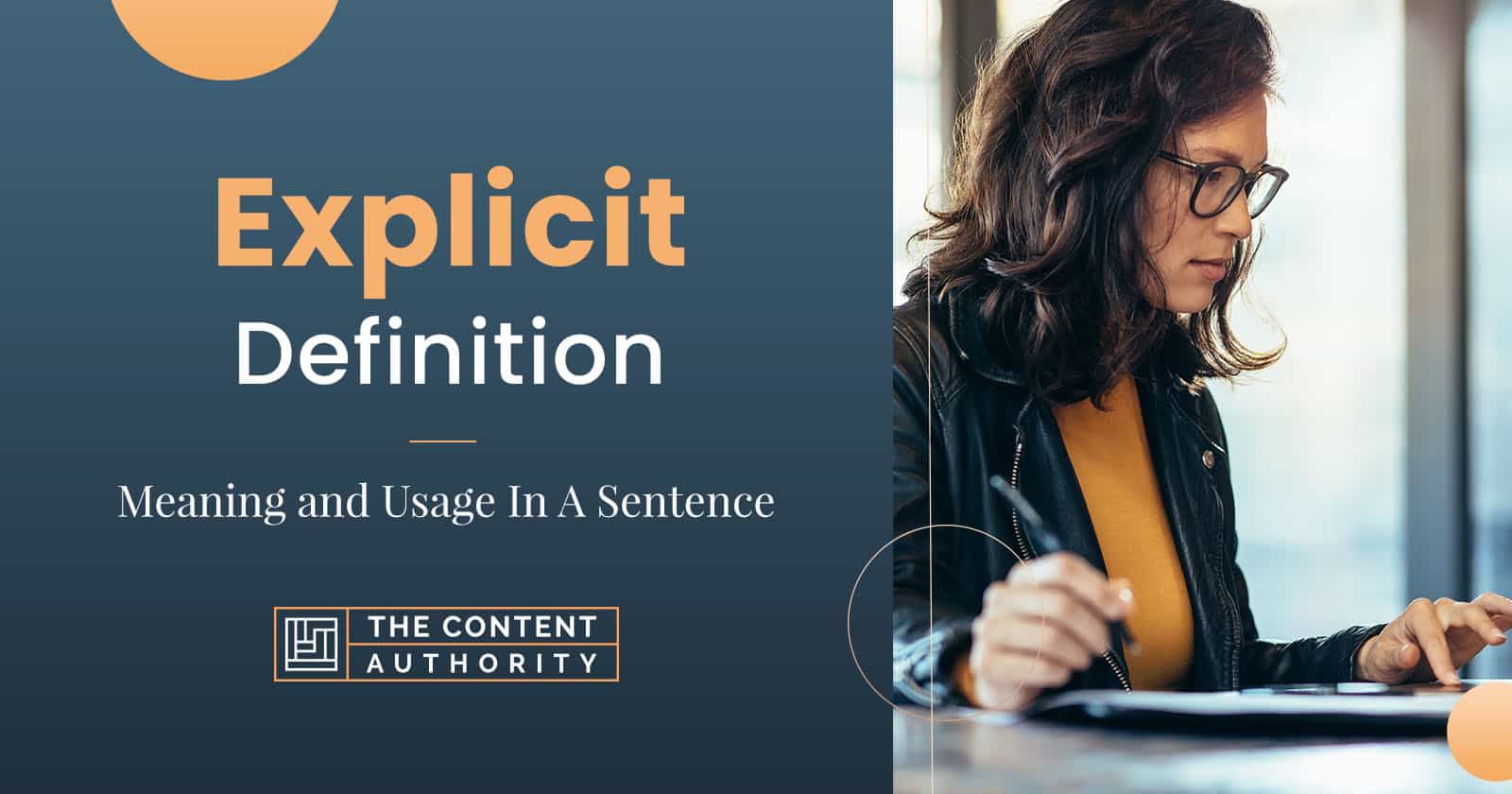The English language is evolving, and we need to keep up with the different vocabularies. One of the best ways to do this is by learning or revising new words like “explicit.” So what’s the best explicit definition, meaning, and how do you use the word in a sentence?
Explicit means: “very clear and complete” or “leaving no doubt about the meaning.” “Explicit” indicates that there is no vagueness. Use “explicit” in writing or communication when talking about something whose meaning and intent are clear.
The word “explicit” appears in various contexts and has shifted meanings. Thus, take time to learn the various meanings and ways to use the words in your sentences. That way, you will make better use of the word. Let’s get started!

What Is the Definition of Explicit?
Explicit means that something has been stated clearly and in detail or can be seen or heard. Something explained in detail with no hidden messages, without a doubt.
An example of an explicit statement is, “Please leave your dishes in the sink when you are done.” In this sentence, there is no ambiguity about what was said.
Explicit statements are always direct and to the point. All the information is immediately available for someone reading or listening to that statement. They can sometimes sound blunt or rude, but they often don’t leave room for confusion about anything.
Nobody likes ambiguity, so when trying to be clear, use explicit statements whenever possible.
Is Explicit A Negative Word?
No, “explicit” is not a negative word, but like many other words, the way you use it will determine its status.
For instance, when someone says that the movie is too explicit, this can be negative. This is because it implies that the context of the movie is “clear and complete.” That might be a bad thing, especially for kids.
Though the word explicit is not negative, the way you use it determines the word’s status. You ought to think about this word and how it fits in your context. Be careful to ensure that you have used them in the right way. Otherwise, you might end up sending the wrong message.
What Are the Explicit Word Forms?
Most words in English have more than one form. Learning different forms of a word helps you write and express the word in your sentences. Here are the different forms:
- Explicitation: (noun)
It means “that which makes something explicit” or “the fact or process of becoming explicit.”
Example: The doctor knew the tests to order despite the explicitation of the family members about the symptoms.
- Explicitness: (noun)
It means “the quality of stating something clearly and directly” or “stating something so that the meaning is clear and easy to understand.”
Example: The lawyer knew that explicitness would help the jury understand the case better.
What is the Meaning of Explicit?
“Explicit” means “showing or referring openly to violence or nudity” or “showing sexual activities.” Use “explicit” when talking about violence, x-rated pictures, or films.
“Explicit” in this context shows when something is too much and not friendly for people to see, read, or hear. It discusses the type of content that children should not see or read.
Example sentences:
- He got suspended for bringing explicit magazines in school.
- It is essential to read the review of the movie your children want to watch so that you can protect them from explicit content.
- Children were not allowed to sing that song because it had explicit lyrics.
A Look at Explicit Synonyms and Their Meaning
Synonyms are words that have nearly the same meaning. In the English language, you will realize that some words have more than one synonym. When writing, especially creative writing, at times, using one word throughout your writing can make your work uninteresting.
That is why it is best to learn about synonyms to replace the word when you are writing. Here is a look at the synonyms of explicit.
- Accurate: Free from error or defect.
- Specific: A fact about some parts.
- Clear: Readily apparent to the mind.
- Precise: Sharply exact, accurate, or delimited.
- Definite: clearly defined.
- Express: Give expression to.
- Unequivocal: Admitting no doubt or misunderstanding.

Explicit Meanings Based on Diverse Contexts
There are different contexts where you can use “explicit.” In either of them, ensure you don’t confuse the word’s meaning. Let’s have a look at some of these instances.
- Mathematics
In math, the word “explicit function” means “containing only the independent variable or variables. It is the opposite of implicit function.
- Law
Explicit in law means “leaving no questions to the meaning and intent.” This is where something, someone, or a situation is clear that the law does not have a hard time interpreting.
- Finance
Explicit in finance means “normal business cost that appears in the ledger.” In finance, you can use the terms “explicit costs” to imply the cost found in a business ledger, the ones that impact the profitability of the company.
How Do You Use Explicit In A Sentence?
Explicit is an adjective that means direct and to the point. When you use it in a sentence, ensure that it describes the qualities or states of nouns.
Note that “explicit” has different meanings, and you need to learn them to know how to use the word in various contexts. In sentences, it can be used to describe something vulgar and inappropriate, such as a song with explicit lyrics, or it can also mean specific and detailed.
It’s important to be aware of the context in which you use explicit, so you know what kind of meaning the word has and how it will affect people who read or hear your writing.
10 Examples of Explicit In a Sentence
If you like playing around with words or you are the creative type, this is a word that you will enjoy learning and practicing. It is also interesting to read the word in different contexts. Here are ten examples to guide you.
- The party was in another city, but my sister gave me explicit directions to get there.
- Based on the high rate of HIV, the relevant information must be made explicit and not left vague.
- Apart from the fact that the film had explicit scenes of violence, it was great.
- The reason that they canceled the wedding should be made explicit.
- The films wasn’t explicit per se but it sure did make us blush.
- The problem with the governor is that he has not been explicit about his intention, and that is why they are working hard to sabotage him.
- She was quite explicit about why she left the acting industry even though she made a lot of money.
- The statement made by the company was an explicit but erudite denial of them being involved with the production of illegal drugs.
- It is important to be explicit when talking about money with your family.
- The difference in how the correctional facility treats white convicts and those of color is more explicit every day.
- The ability to make sure that everyone gets along in the organization was the explicit goal of the management from day one.
How Do You Spell Explicit?
The word ‘explicit’ is spelled as “e-x-p-l-i-c-i-t.” More so, explicit has the same spelling in American and British English.
How Do You Pronounce Explicit?
“Explicit” is pronounced as “ek.plis.it.” However, the pronunciation is different in American and British English.
How Many Syllables Are In Explicit?
The word explicit has three syllables. These syllables are divided as ex-plic-it. The stressed syllable in the word is -plic.
History And Etymology of Explicit
The origin of the word “explicit” is Latin. In the Latin Language, the word comes from “explicare” meaning “to unfold.” “To deploy” or “to spread out.”
The French later borrowed the word and changed it to “explicite.” In the French language, that also means “to unfold” or “unravel.” Later on, the English Language borrowed the word from the French and introduced it as “explicate.” In English, the word means “analyze and develop an idea in detail.” But as the English language continues to evolve, the word “explicit” now has diverse forms and meanings.
When Was Explicit First Used?
The first use of the word “explicit” was in 1549.
During this time, the main definition was “to be clear.” However, the word evolved, and in the late 19th century that the word was introduced to violent and sexual scenarios, giving birth to phrases such as “violence explicit” and “sexually explicit.”
Conclusion
“Explicit” might seem like one of those complex words that you will never fully understand. But if you take the time to review the explicit definition and meaning, you will know it is a simple word you can use in a different context due to various meanings.
Have you fully understood the meaning and definition of the word “explicit?” How confident are you when creating sentences with this vocabulary? There is no better way of learning a word than creating a correct sentence, and it is easy; keep practicing.
Shawn Manaher is the founder and CEO of The Content Authority. He’s one part content manager, one part writing ninja organizer, and two parts leader of top content creators. You don’t even want to know what he calls pancakes.

